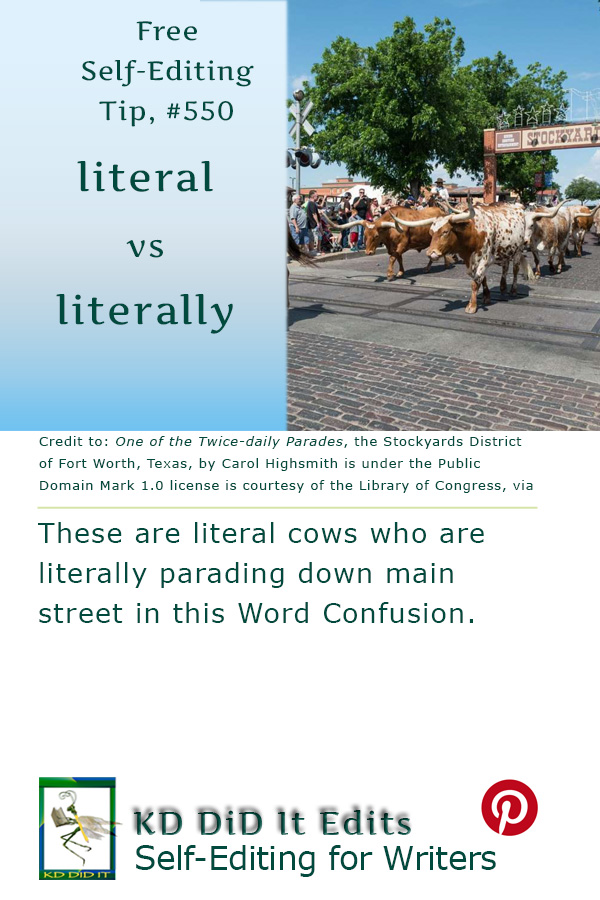Revised as of
8 July 2023
It is the literal truth that there are literally a multitude of disputes amongst linguists as to whether using literally to merely emphasize what it refers to is acceptable or not.
A number of style guides accept literally in the emphatic sense when used informally (as opposed to the literal sense) provided that this additional emphasis is actually required.
In formal writing, use literally in its exact sense — and exactly what is said.
To get around this, consider using virtually.
“Virtually allows speakers and writers to enhance and embellish to their hearts’ content, options they relinquish when using literally” (Literally).
I virtually hit the ceiling.
Their dreams virtually collapsed.
| Consider the following: | |
| The party literally went off with a bang.
Only if there was an actual loud noise! |
The party went off with a bang.
The party was great! |
| I literally ran more than 25 miles today.
I ran a marathon. |
I ran more than 25 miles today.
A more accurate sentence that isn’t dressed up with emphasis. |
Word Confusions . . .
. . . started as my way of dealing with a professional frustration with properly spelled words that were out of context in manuscripts I was editing as well as books I was reviewing. It evolved into a sharing of information with y’all. I’m hoping you’ll share with us words that have been a bête noire for you from either end.
If you found this post on “Literal versus Literally” interesting, consider subscribing to KD Did It, if you’d like to track this post for future updates.
| Literal | Literally |
|---|---|

Simple Tiramisu by Sebastian Kügler, 25 December 2005, via Wikimedia Commons. — A literal close-up of this “pick me up”. |

Tvarohové Tiramisu by Matěj Baťha is under the CC BY-SA 3.0 license, via Wikimedia Commons. — I could literally eat the whole thing! |
| Part of Grammar: | |
| Adjective; Noun
Plural for noun: literals |
Adverb |
| Adjective: Taking words in their usual or most basic sense without metaphor or allegory
[Of a translation] Representing the exact words of the original text
[Also literal-minded; of a person or performance] Lacking imagination
Of, in, or expressed by a letter or the letters of the alphabet Noun: |
In a literal manner or sense
[Informal] Used in an exaggerated way to emphasize a statement or description that is not literally true or possible Virtually |
| Examples: | |
| Adjective: Janni’s marriage was fifteen years of literal hell. You asked for a literal translation; that’s what I’ve given you. I can’t believe how literal your representation is of our farm. She is quite literal-minded without any imagination. Literal mnemonics are abbreviations or letters which are easily associated with the name of a subject, i.e., H is for History, A is for Arts, and F is for Fiction. Noun: Check endnote 19 to verify if Pest is a literal for Peat. |
The driver took it literally when asked to go straight across the traffic circle.
Tiramisu is literally translated as pick me up. He took her comment literally. The party was attended by literally hundreds of people. The story was basically true, even if not literally true. Informal: He never did appear where she could see him. Ever. I have received literally thousands of letters. They bought the car and literally ran it into the ground. He will literally tear the house apart looking for his cellphone. We were literally killing ourselves laughing. |
| Derivatives: | |
| Adjective: literalistic, nonliteral, overliteral Adverb: nonliterally Noun: literalism, literalist, literality, literalness, nonliteralness Verb: literalize |
|
| History of the Word: | |
| Late Middle English from the Old French or from the late Latin litteralis, which is from the Latin littera. | 1525-35 literal + -ly. |
C’mon, get it out of your system, bitch, whine, moan . . . which words are your pet peeves? Also, please note that I try to be as accurate as I can, but mistakes happen or I miss something. Email me if you find errors, so I can fix them . . . and we’ll all benefit!
Satisfy your curiosity about other Word Confusions on its homepage or more generally explore the index of self-editing posts. You may also want to explore Book Layout & Formatting Ideas, Formatting Tips, Grammar Explanations, Linguistics, Publishing Tips, the Properly Punctuated, Writing Ideas and Resources, and Working Your Website.
Resources for Literal versus Literally
Apple Dictionary.com
“Literally.” GrammarBook. n.d. Web. 18 Sept 2022. <https://www.grammarbook.com/homonyms/literally.asp>.
Pinterest Photo Credits:
One of the Twice-daily Parades, the Stockyards District of Fort Worth, Texas, by Carol Highsmith is under the Public Domain Mark 1.0 license is courtesy of the Library of Congress, via Picryl.


